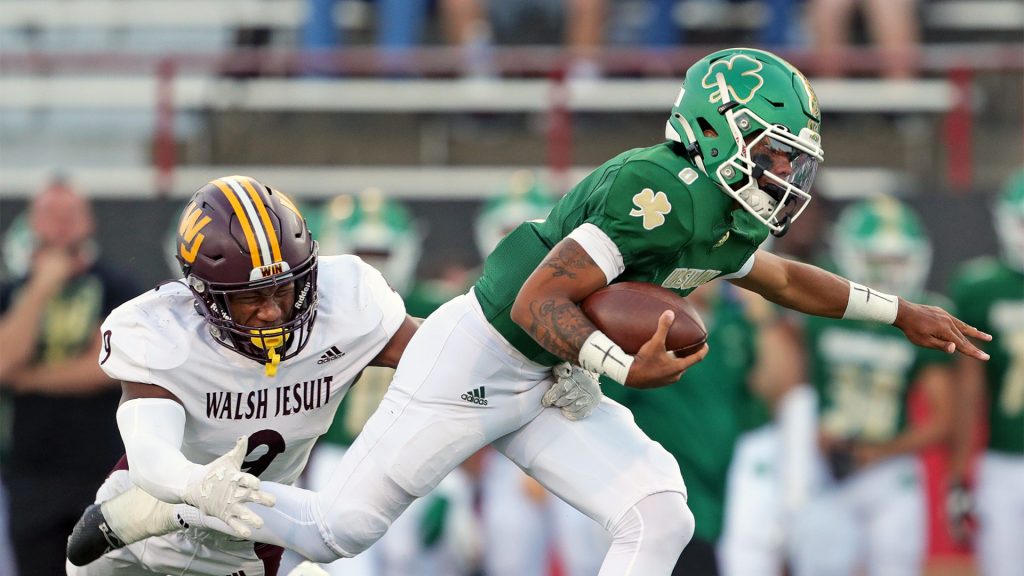Seasons canceled, coaches fired: The cost of hazing in high school football

David Bianchi calls the months of September and October “Hazing Season.” The Miami-based attorney has represented families in hazing cases for more than four decades. Incidents that were decades ago thought of as college fraternity rituals have trickled down into the high school ranks.
“The hazing problem has been around for a long time, and believe it or not, despite all the efforts to try to stop it, it seems to be getting worse, not better,” Bianchi said.
Where are the hazing incidents happening?
Several recent incidents across the country center on high school football teams and have led to suspensions, firings, lawsuits, criminal investigations and the cancellation of games.
There have been at least five high-profile cases in the news since late August. The principal at Elk Grove High School in Sacramento, California, sent a letter to parents outlining a hazing incident involving members of the football team, which led to the suspensions of several students. Administrators are now looking into the school’s “locker room culture.”
A week later, an incident at a rival school, just five miles away, led to the suspension of seven Monterey Trail High School football players.
Kentucky State Police have opened an investigation into hazing-related sodomy allegations involving the football team at McCreary Central High School, which took place at a preseason football camp in August. Police seized brooms as part of the investigation.
Harford Technical High School in Bel Air, Maryland, fired its head football coach and four assistants on Sept. 18 amid an investigation into hazing allegations.
Are there state laws against hazing?
Even though 44 states have laws against hazing, there are dozens of documented cases each year, many of which involve criminal acts, according to the National Federation of State High School Associations. Bianchi receives calls from the parents of victims every week and believes it’s simply a matter of accountability.
“You’ve got all the laws, rules and regulations that you can think of on the books, but it keeps happening,” Bianchi said. “The reason it keeps happening is that we’re not tough enough on trying to enforce these laws and regulations. And when these incidents do happen, the punishment is not swift or stern enough.”
A Title IX federal lawsuit has been filed in Ohio alleging widespread hazing in the football program at Ursuline High School in Youngstown involving more than 20 students. The lawsuit says coaches and administrators were aware of the allegations and did nothing. The school canceled the remainder of the football season on Sept. 12.
What happened at Ursuline High School?
The lawsuit filed Sept. 2 accuses members of the football team of engaging in hazing, sexual assault and the dissemination of child pornography, among other offenses. It details the disturbing experience of a player who endured an “initiation” during a nine-day football camp in June. Subodh Chandra, who represents the player and his family, said the incidents go way beyond a harmless prank.
“What the law does prohibit is these sorts of violent acts, sexualized acts and other things,” Chandra said. “And so it’s very difficult to comprehend, number one, how does a culture like this develop across time, as is alleged in the lawsuit regarding the Ursuline football team? How do coaches tolerate it, look the other way?”
Straight Arrow News reached out to Ursuline High School and the Archdiocese of Youngstown for comment but has not yet received a response.
The 200-page lawsuit alleges the coaching staff knew about the hazing and, when confronted, dismissed the actions as “just boys being boys”. The suit also accuses the school’s administration of failing to properly investigate. Chandra said the parents of the victims are baffled and don’t understand how their pleas for help could go unheard. He believes the Ursuline football team appeared to be more important than any other values at the school.
“How those cultures develop, how they sustain themselves, how they remain resilient against criminal law. Against civil liability prospects, against basic humanity and decency, is really unclear to me. It’s incomprehensible,” Chandra said. “But there is, according to the suits, a kind of groupthink that develops within the team and with the coaches and perhaps even with the administrators.”
What role does technology play in hazing incidents?
Unbiased. Straight Facts.TM
A 2017 YouGov study found that 22% of high school students have experienced some form of hazing.

That groupthink can be stimulated and even encouraged by technology. Many of these high-profile hazing incidents involve video recordings taken by bystanders or those directly involved. The videos are then typically distributed within the group via Snapchat or other apps and, in some instances, shared even wider on social media.
Todd Shelton, CEO of the Hazing Prevention Network, believes a viral, copycat mentality is pervasive in this social media generation.
“There’s a level of one-upmanship occurring where someone sees a hazing instant and they think it’s funny or they think it’s cool,” Shelton said. “They want to do it with their team or their new members, and they want to one-up the incident that they saw because they want theirs to be the one that people think is cool. And so, yes, I think it’s absolutely making hazing worse.”
Bianchi agrees phones and social media have become a much bigger part of hazing in recent years. That technology also brings more of these cases to light.
“Then the kids try to take it down, but you can’t take it down because you can’t put the genie back in the bottle,” Bianchi said. “And let me tell you, these incidents have long-term consequences, even for high school students, because what happens is when you record it and you post it, and now you can’t take it down. This is going to follow you for the rest of your life. If you Google the kid’s name five years from now, 10 years from now, you can’t get rid of it.”
What happens when athletes think they are ‘invincible?’
Another factor that Bianchi said can perpetuate hazing at the high school level is the feeling that football stars who could go on to earn big dollars under college football’s new revenue-sharing model are immune to the rules. Those players are often team leaders and may feel they are “invincible.”
“They’re involved in a sports team where they are highly recruited, and they’re driving a fancy car, and they’ve got more money than they ever dreamed of,” Bianchi said. “You throw that into the mix with all the other ingredients that make a perfect case for hazing, it’s only going to make the problem worse, because they’re going to feel like they’re bulletproof. They can get out of anything.”
How can parents and administrators stop hazing?
Shelton, who coordinated National Hazing Prevention Week between Sept. 22-26, calls hazing the abuse of a power dynamic by people already a part of a group or organization against those trying to become a part of it. Stopping it requires education and clear penalties.
“I think it’s important that organizations and administrations have a level of transparency and educate their current and potential members about the issue of hazing,” Shelton said. “They have clear, trusted channels for reporting, and then they do something about it. They take those reports seriously and hold those involved accountable.”
Shelton pointed to a 2017 study from YouGov that said 22% of students experienced some form of hazing in high school.
“I think what startles me the most is so often the hazing that we see in high school athletics involves sexualized hazing,” Shelton said. “That to me certainly has great potential for physical harm, but also the emotional harm is at a great level when we see that.”
The school districts are still investigating the five most recent incidents mentioned in this report, and in several cases, law enforcement is also conducting investigations.
The post Seasons canceled, coaches fired: The cost of hazing in high school football appeared first on Straight Arrow News.





